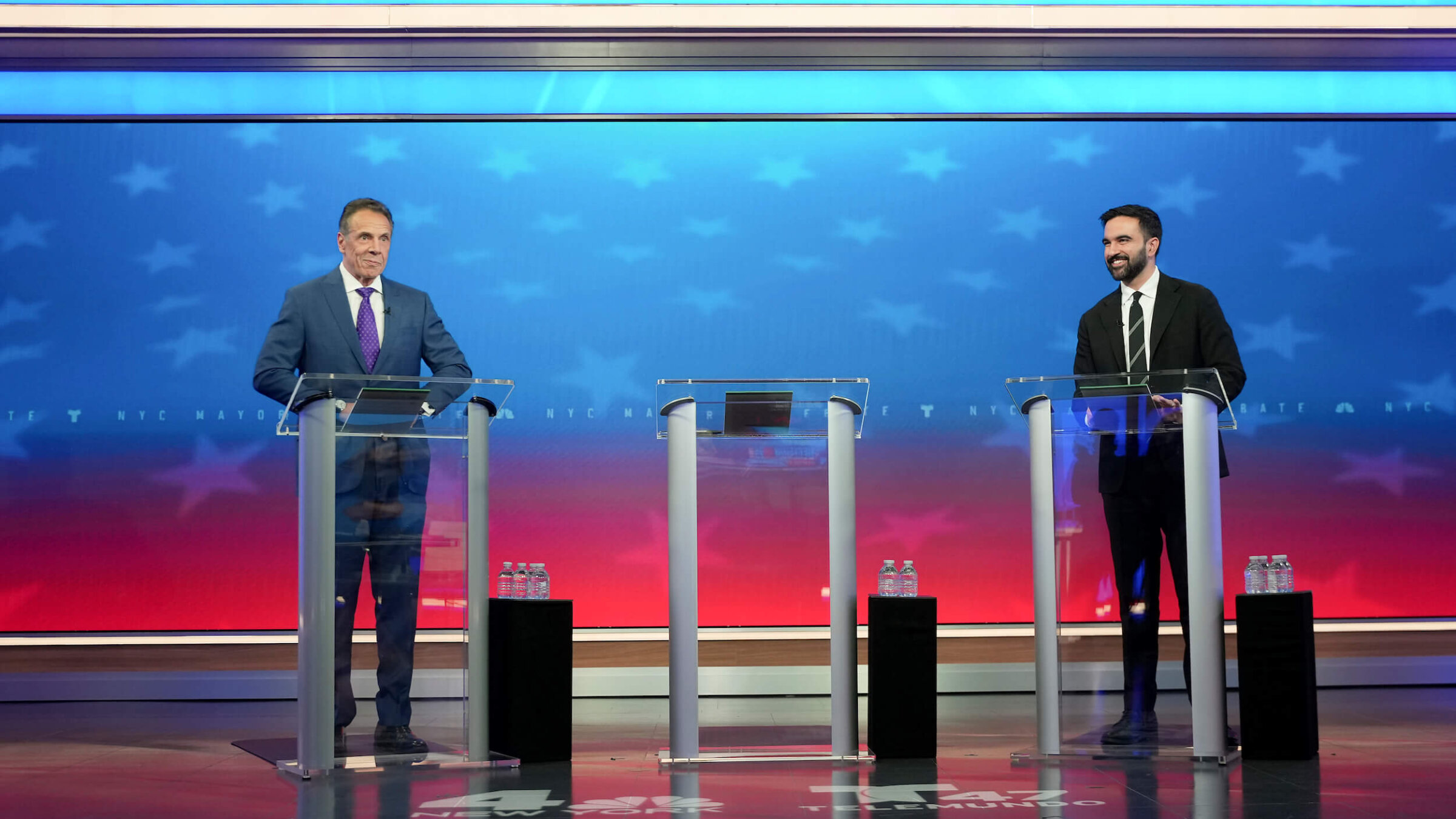In the Mamdani-Cuomo race, why should I choose safety as a Jew over safety as a woman?
The relentless focus on whether Mamdani is a threat to Jews overlooks his opponent’s alleged record with women

Former New York Gov. Andrew Cuomo, running as an Independent, and Democratic mayoral nominee Zohran Mamdani prepare for a mayoral debate on Oct. 16. Photo by Angelina Katsanis-Pool/Getty Images
When we talk about Jewish safety, whose safety, exactly, are we talking about?
I found myself mulling that question after Rabbi Elliot Cosgrove, of Manhattan’s Park Avenue Synagogue, recently came out against Democratic New York City mayoral candidate Zohran Mamdani. Instead, Cosgrove encouraged his congregants to support former Gov. Andrew Cuomo. He said he was moved to take that public stance out of concern for Jewish safety and the Jewish future.
“It’s not my style to endorse any candidate. But as a rabbi, when there’s a threat to the Jewish community, I believe it’s my responsibility to call that out,” Cosgrove told Haaretz in a follow-up interview.
Cosgrove was articulating one understanding of Jewish safety — an understanding contingent on politicians voicing support for Israel. He has been far from alone in the run-up to this election, for which early voting is already underway.
The American Jewish Committee expressed “alarm” at Mamdani’s charge that Israel has committed genocide in Gaza, and his refusal to say he supports the existence of Israel as a specifically Jewish state, among other positions. (Mamdani has said he does not support any state’s right to a racial or religious hierarchy.) The group urged Mamdani to better consider the concerns of the Jewish community, and “change course.”
Jonathan Greenblatt, head of the Anti-Defamation League, has attacked Mamdani as being insufficiently committed to Jews and Jewish safety. More than 1,000 rabbis across the country signed a letter, citing Cosgrove’s speech, that denounces Mamdani and the political normalization of anti-Zionism.
But there’s an understanding of Jewish safety missing from that viewpoint — one that largely impacts Jewish women.
Cuomo resigned as governor after being accused of sexually harassing multiple women — 13, per the Department of Justice — while in office. He was accused, in one case, of attempted retaliation; in another, he sought the gynecological records of one of his accusers.
Why is his alleged behavior not also seen as a threat?
I don’t live in New York City. I can’t vote in the mayoral election. But the failure of so many Jewish leaders to meaningfully engage with what Cuomo’s election might mean for women has deeply alarmed me.
I do not know how to be just Jewish or just a woman. I only know how to be a Jewish woman. And the idea that I, or any woman, has to pretend that the normalization of sexual harassment in politics is somehow irrelevant to our day-to-day safety — because our commitment to Jewish peoplehood comes first — seems to me to be an extremely limited understanding of Jewish safety. And, for that matter, of Jewish peoplehood.
For many Jewish women, we cannot talk about threats to our safety and dignity, and the importance of preserving our ability to move through the world without fear — all subjects rightly brought up when we speak of Jewish safety — and not talk about sexual harassment. That harassment is wrapped up in how we experience antisemitism: Antisemitic abuse toward women often includes sexist language. For example, in response to my writing as a Jewish woman weighing in on Jewish politics, I have been told more than once that I deserve to be sexually assaulted.
And sexual harassment has been a serious issue in explicitly Jewish spaces. For just two examples: Leading Jewish sociologist Stephen M. Cohen was accused of sexual harassment and forcible touching by multiple women in 2018. Leading Jewish philanthropist Michael Steinhardt was accused of a pattern of sexual harassment the following year. More generally, a 2023 poll found that 35 percent of women in the U.S. have been sexually harassed or abused in the workplace. 81% of women nationwide report experiencing sexual harassment at some point in their lives; it stands to reason that, for Jews, that statistic is likely similarly, shockingly high.
There is a meaningful risk that the election of a mayor with a record like Cuomo’s would make women feel less secure reporting harassment to those in power. It’s also possible his election would make women more likely to experience harassment from those who might see his victory as an opening to resume patterns of behavior briefly made taboo by the #MeToo movement. To avoid seriously contemplating those prospects when considering which mayoral candidates might endanger the well-being of New York City’s Jews is to treat the specific safety of Jewish women, and other Jewish victims and survivors of sexual harassment and assault, as secondary.
I know that not every Jewish woman will agree with me. Many of the rabbis who signed the letter warning against Mamdani were women. I know that there will be those who say that this is irrelevant, or not a Jewish issue. I know there will be others who feel, even if they wouldn’t say so, that Jewish women should, in this instance, place concerns tied to their womanhood behind concerns tied to their Jewishness.
But I can’t untie the two. And I can’t understand why so many leaders in my community seem not to have even considered the possibility that the return to power of an accused serial sexual harasser might be relevant to Jewish safety and dignity.
It’s true that many of those who have spoken out against Mamdani have not explicitly thrown their support behind Cuomo. But as Cosgrove noted, to not support one is effectively to support the other.
And here is the broader picture of what we risk supporting by not treating sexual harassment as a real danger: We live in a country in which the president has been found liable of sexual abuse and was still reelected; two Supreme Court justices have lifetime appointments despite having been accused of sexual harassment and assault; and the Defense Secretary was accused of sexual assault and was confirmed anyway.
All of that is normal now. You can be accused, credibly and repeatedly, of sexual harassment or worse and still be given immense power. So, I have to ask: Isn’t that normalization a threat to the safety and dignity of the many Jews who are women? And if not: why not?
















